This plaque, which is dedicated to Moina Michael, also known as “The Poppy Lady”, stands in a strip of land on Broad Street, across from the UGA Arch. Moina was a Normal School teacher in her life and was a professor at the University of Georgia when the U.S. became involved in first World War in 1917. She saw it as a call to action, taking a leave of absence from teaching to voluntarily train members of the World Young Women’s Christian Association in New York. After the war, Michael began teaching courses to veterans back on UGA campus and, inspired by the battle poem In Flanders Field by John McCrae- including the line “in Flanders Field the poppies blow”- began wearing a red poppy each day in commemoration. The end of the war facilitated the return of millions of injured and newly disabled men. Seeing this, Moina began to popularize the idea of the poppy as a symbol for World War I veterans and aimed to fund their care with programs selling silk poppies to the public. Her mission consisted of both raising money for the welfare of veterans and ensuring that the poppy would become the official symbol for veterans of war in the eyes of the government, the public, and the world. At the time of her death, sales of her “remembrance poppies” had raised over $200 million. Today, the tradition of using or planting red poppies for the remembrance of war survivors continues, most prominently on Remembrance Day in the U.K. and similar holidays in other commonwealth nations.

